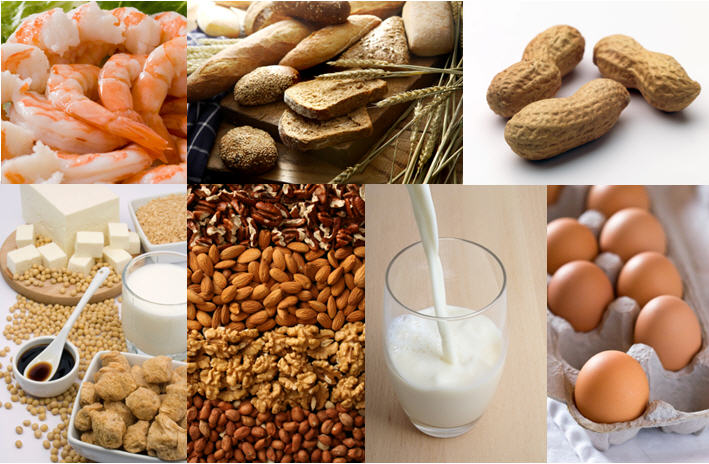A food allergy is an exaggerated immune response triggered by eggs, peanuts, milk, or some other specific food.
Causes, incidence, and risk factors
Normally, your body's immune system defends against potentially harmful substances, such as bacteria, viruses, and toxins. In some people, an immune response is triggered by a substance that is generally harmless, such as a specific food.
The cause of food allergies is related to your body making a type of allergy-producing substance called immunoglobulin E (IgE) antibodies to a particular food.
Although many people have a food intolerance, food allergies are less common. In a true food allergy, the immune system produces antibodies and histamine in response to the specific food.
Any food can cause an allergic reaction, but a few foods are the main culprits. In children, the most common food allergies are to:
- Eggs
- Milk
- Peanuts
- Shellfish (shrimp, crab, lobster)
- Soy
- Tree nuts
- Wheat
A food allergy frequently starts in childhood, but it can begin at any age. Fortunately, many children will outgrow their allergy to milk, egg, wheat, and soy by the time they are 5 years old if they avoid the offending foods when they are young. Allergies to peanuts, tree nuts, and shellfish tend to be lifelong.
In older children and adults, the most common food allergies are:
- Fish
- Peanuts
- Shellfish
- Tree nuts
Food additives -- such as dyes, thickeners, and preservatives – may rarely cause an allergic or intolerance reaction.
An allergy syndrome that affects the mouth and tongue may occur after eating certain fresh fruits and vegetables. These foods contain substances similar to certain pollens. For example, melon contains substances similar to ragweed pollen, and apples have allergens similar to tree pollen.
Many Americans believe they have food allergies, while in reality fewer than 1% have true allergies. Most symptoms are caused by intolerances to foods such as:
- Corn products
- Cow's milk and dairy products (Lactose intolerance)
- Wheat and other gluten-containing grains (Celiac disease)
Symptoms
Symptoms usually begin immediately, within 2 hours after eating. Rarely, the symptoms may begin hours after eating the offending food.
If you develop symptoms shortly after eating a specific food, you may have a food allergy. Key symptoms include hives, hoarse voice, and wheezing.
Other symptoms that may occur include:
- Difficulty swallowing
- Itching of the mouth, throat, eyes, skin, or any area
- Lightheadedness or fainting
- Patches of itchy, scaly skin (atopic dermatitis); skin may peel or blister
- Swelling (angioedema), especially of the eyelids, face, lips, and tongue
Symptoms of mouth (oral) allergy syndrome:
- Itchy lips, tongue, and throat
- Swollen lips (sometimes)
Signs and tests
In severe reactions, you may have low blood pressure and blocked airways.
Blood or skin tests are sometimes used to confirm that you have an allergy. However, there is no well-accepted criteria for diagnosing food allergies.
With elimination diets, you avoid the suspected food until your symptoms disappear. Then the foods are reintroduced to see if you develop an allergic reaction.
In provocation (challenge) testing, you eat a small amount of the suspected food allergen under medical supervision. This type of test may provoke severe allergic reactions. Challenge testing should only be done by a doctor.
Never try to deliberately cause a reaction or reintroduce a food on your own. These tests should only be performed under the guidance of a health care provider -- especially if your first reaction was severe.
Treatment
The only proven treatment for a food allergy is to avoid the food. Other treatments, including allergy shots and probiotics, have not been clearly proven to help with food allergies.
If your child has a problem with cow’s milk formula, your health care provider may suggest trying a soy-based formula or something called an elemental formula, if available.
If you suspect you or your child has a food allergy, consult an allergy specialist.
If you have symptoms on only one area of the body (for example, a hive on the chin after eating the specific food), you may not need any treatment. The symptoms will likely go away in a brief time. Antihistamines may relieve the discomfort. Soothing skin creams may provide some relief.
Consult your doctor if you think you have had an allergic reaction to food, even if it is only a local reaction.
Anyone diagnosed with a food allergy should carry (and know how to use) injectable epinephrine at all times. If you develop any type of serious or whole-body reaction (even hives) after eating the offending food, inject the epinephrine. Then go to the nearest hospital or emergency facility, preferably by ambulance. Seek immediate medical attention after injecting epinephrine for a food reaction.


No comments:
Post a Comment